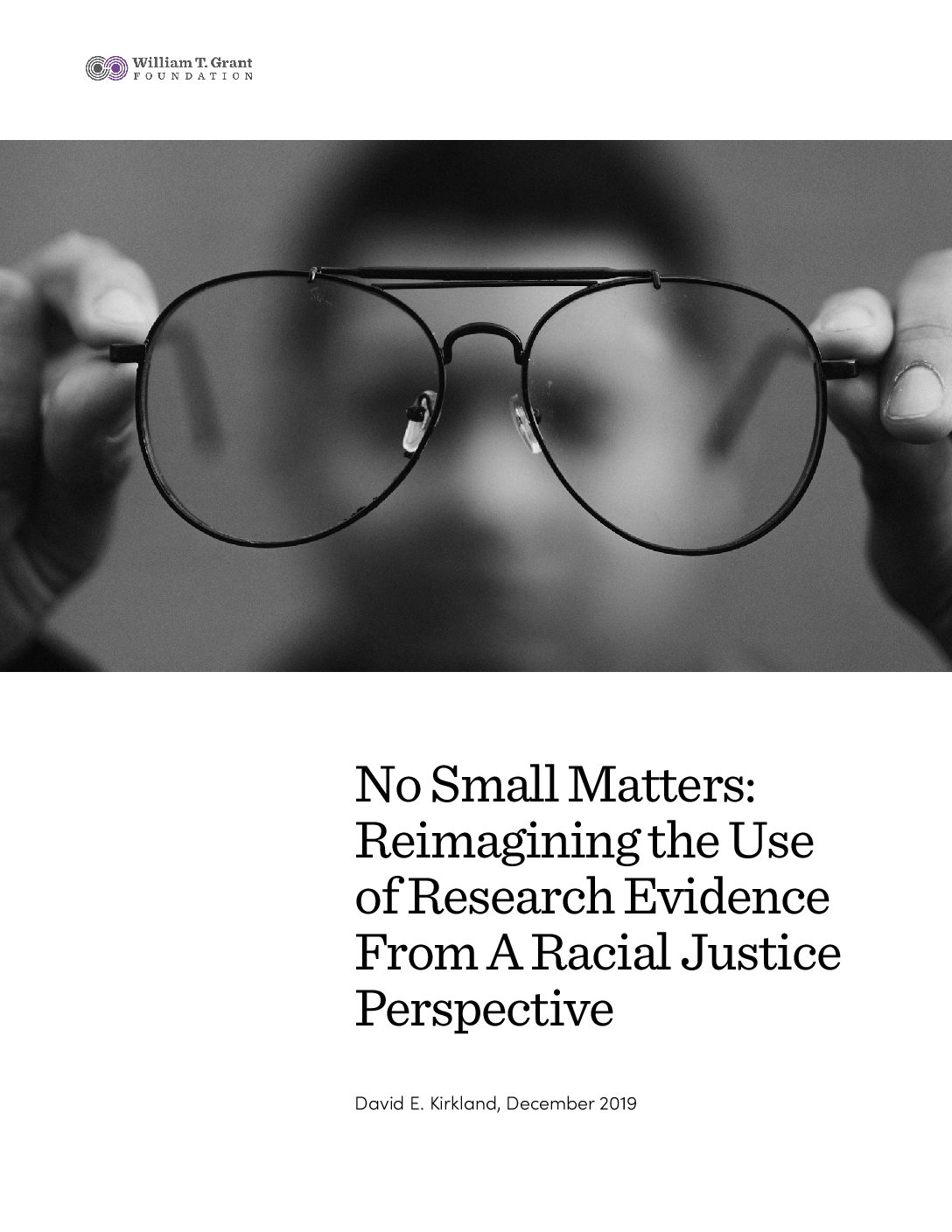Among researchers and others in the field who examine the use of research evidence in policy and practice, questions of how and what have been the primary locus of inquiry. Considerably less attention is directed toward questions of why, who, and for whom research is used. From a racial justice perspective, to not raise these questions from the beginning can be thought of as an exercise in dismissal—the hardline of indifference that is not about remembrance or amnesia but the power inchoate in not having to recognize, acknowledge, or grapple with the forces of history (cf. Alexander, 2012).
It would be naïve to consider the use of research evidence a neutral act. The (mis)use of research evidence, from test scores to skull sizes to “validated” assumptions about what constitutes beauty, has been used to construct the ideology of race—to set in motion the racial hierarchy that both elevates and centers Whiteness while simultaneously reducing and criminalizing Blackness. The (mis)use of research evidence has seen Black bodies reduced as the object of White oppressive fetish (e.g., the Black body as empirically sexualized and contrived as abnormal, a monstrosity, etc.), preoccupation with social control (e.g., the Black body as target of sterilization), and experimentation (e.g., the Black body as experiment for White medicine).
It would be naïve to consider the use of research evidence a neutral act.
That is, attempting to conceptualize the use of research evidence without critical attention to why, who, and for whom that evidence is used misses a vital truth: The use of research evidence is not only embedded in systems of power, it is a system of power.
Research Use as a System of Power
As a system of power, the use of research evidence (as ideology rather than practice) is legitimized based on two mirroring and not altogether different assumptions. One is “data determinism,” or the neoliberal, hyper-positivist idea that data (the main ingredient in neo-enlightenment) is neutral and unbiased, and that it, by itself, can improve our world. The former proposition is an outright fiction; the latter is incomplete, if not also a fiction. Data cannot improve the world, but its use can offer crucial information that can serve humanity as people collectively struggle to improve it. Data cannot determine truth or reality, but its use can give powerful people a tool or a weapon for making claims about them.
The second assumption deals with what I call the “objective fallacy,” which is the false idea that objectivity is real, fair, even-handed, neutral, and attainable—the source code of deity. It gives permission to distortions of what can be considered true that form a bulwark against questions that poke legitimate holes in claims to authority and supremacy, as well as lies that masquerade as truth to hold the fictions of authority and supremacy in place.
First, positing objectivity as real and attainable might mean that there is a plane in human existence where humans exist beyond our humanity, as machines or worse gods among humans. Thus, the idea of a pure objectivity is not in accord with human reality because all knowledge is mediated through lived experience, emotions, culture, society, etc. and is therefore not objective at all. Only in a different (non-human, non-human-mediated) plane of existence could a pure objectivity exist. We know that this plane does not exist, cannot exist, and is neither desirable or appreciable. God-in-human sets in motion the hierarchy that subordinates god-outside-human. One can know. The other, however, is merely known—not based on their knowledge of themselves, but based in the knowledge of the objective observer.
So often throughout history, research evidence has been used to enforce master narratives of White supremacy and anti-Black racism while also conditioning us to believe that this social order is, in fact, legitimate.
Second, objectivity as fair, even-handed, and neutral replicates the false assumptions inherent to objectivity as real and attainable. That is, neutrality is a political act that implies some even or fair treatment of a subject or a thing. This equality defies equity, because treating all things the same in human science is a corruption that omits the fundamental reality of human difference. Fairness is not objective, neutral, or even-handed. Objectivity is none of these things either.
By understanding how these assumptions operate, we see that we have masked the use of research evidence in cheap robes to position it in a place of authority as opposed to a place of utility. This authoritative positioning has worked throughout history to reinforce the master scripts of racial hierarchy as opposed to rewriting those scripts. So often throughout history, research evidence has been used to enforce master narratives of White supremacy and anti-Black racism while also conditioning us to believe that this social order is, in fact, legitimate. To not have to acknowledge the use of research evidence in the maintenance of White supremacy and anti-Black racism is itself an act of White supremacy and anti-Black racism.
Diverging from Convention
Can the use of research evidence ever be neutral or politically innocent, particularly as it pertains to questions of race and intersectional vulnerabilities? Can it be exempted from its sociohistorical and political positioning or the racial qualms we as researchers or users of research bring into it. That is, what does research evidence mean when collapsed against the weight of social fragmentation and implicit and explicit racial bias, and what does it mean when filtered through sets of conventional assumptions that yield to the supposed primacies of Whiteness and crippling distortions of anti-Black racism?
We’ve seen research evidence used to reinforce dominant narratives of subject positions along existing racial hierarchies where data have been weaponized to encourage deficit narratives of uncivilized, undervalued, and unworthy non-White bodies. We feel these tensions in our bodies when we read Moynihan (1965)—which produced a questionable but altogether gripping narrative of Black deviance—a narrative driven by data that more or less interpreted Black bodies, particularly Black mothers, as problems measured against the nuclear stereotype of the imagined White family. Even Ray Rist (1970) in his foundational studies of social reproduction, a form of which he came to term “self-fulfilling prophecy,” closed his eyes to his own positionality when reporting about the “ineptitude” of a teacher who leaves her students alone in a classroom to deal with an incident outside it. This narrative is dark and incomplete, lacking full context and a fair treatment of what might have driven the teacher to leave her students in a class to handle a situation outside it. In fact, she didn’t leave them alone. Rather, she left them with an adult—Ray Rist—while she attended to an issue she found pressing.
But what if we used the evidence differently? What if we were able to acknowledge the deficit framework in action?
More recently, I’ve analyzed the quantitative data narrative of causation typical in research that examines how low literacy rates drive high incarceration rates (Kirkland, 2019). The treatment of the evidence tends to locate a problem in the individual—usually Black or Brown—who lacks something (e.g., words, motivation, grit, resilience, etc.). But what if we used the evidence differently? What if we were able to acknowledge the deficit framework in action? I wonder if we might come to other conclusions—for instance, that the same thing that causes low literacy rates also causes high incarceration rates? That is, what if low literacy rates did not cause high incarceration rates, but both shared a common structural cause such as institutional bias or trauma?
In a 2018 presentation on mass incarceration, Khalil Gibran Muhammad discussed how data are situated in racialized historical contexts. In his presentation, Muhammad provided historical data examples from prisons in Boston and the deep South from the time of American reconstruction until now. He described data that indicated a kind of reverse racial disparity between Black and White prisoners. According to Muhammad, immediately following the enslavement of Black Americans (and for decades after), prison numbers in Boston showed almost no Black inmates. Muhammad cautioned that if we take this data at face value we would conclude that Whites were disproportionately more likely to face incarceration than Blacks (which was true). However, there was more to the story. Muhammad went on to historicize the prison data, showing how prisons were sites of mercy for White criminals. Blacks accused of crimes were simply not extended the mercy of justice or jail; many were assumed guilty and executed without trial or jury. As vigilante justice waned over the course of American history—with various rights movements—the population of Black bodies in prisons exploded. Importantly, how we understood prisons also shifted—along with our concepts of mercy and justice and law and criminality. Thus, a focus on the data outside racial and historical context would be misleading use.
When construed not as a means of ending conversations but starting them, using data and research can have exponential value.
In Playing in the Dark: Whiteness and the Literary Imagination, Toni Morrison (1992) illuminated a racial subtext that she described as a dark abiding presence looming in American Literature. Morrison attempted to overturn pervasive critical agendas that ignore racial representations and, thus, impoverished literary studies by erasing the interdependent constructions of Whiteness and Africanness. In a similar way, the use of research evidence comes to us both impoverished and incomplete when evading how it both constructs and is constructed by race. That is, divorced from this context, research evidence on its own is incredibly limited. But when construed not as a means of ending conversations but starting them, using data and research can have exponential value. What a research-informed discourse might entail will always exist in flux, but it should include acknowledgements of the ways that we are fundamentally constituted of and predisposed by our own racialized positionalities—how these positionalities are informed by political histories that both author and edit particular dominant narratives and conceptions of truth.
These predispositions make the use of research evidence rife with social, cultural, historical, racial, and political complexities that must be considered in the practice of research. And these predispositions are no small matters—they reinforce how we come to the evidence, what evidence is visible, what stories become legible when that evidence is visible, and which ones are not when evidence remains invisible. They call us to consider how the use of research evidence, outside of a critical race interrogation, almost naturally pulls us toward reinforcing systems of existing racial hierarchy—reinforcing White supremacy and anti-Black racism. One need only look at how our misreading (and miscalculation) of achievement data has yielded overly racialized and unhelpful gap discourses (cf. Kirkland, 2010), let alone how our collection of achievement data has led us to avoid questions of what constitutes achievement and how those constitutions function to redesign racial caste as opposed to the production of knowledge useful for advancing equity.
These problems permeate the social sciences. In fact, one can argue that they are the reason for the social sciences—our insatiable impulse to label, categorize, rank, file, uplift and flatten, engineer, and legitimate human existence. Still, it is imperative that we do all we can to attend to the forces that sit silently in our sciences, that make the use of research evidence lightweight racist. Research teams must be composed in ways that allow for checks against all racist impulses and ideas (Kendi, 2017) that live dormant, if not in the evidence itself, in the use. Grants must be made in ways that incentivize researchers to always include diverse and critical perspectives in the conception and design of the work. We have to imagine and promote more participatory approaches to the use of research evidence that might democratize social sciences. And we need to envision ways for funding agencies to prioritize technical assistance aimed at shifting mindsets, policies, and practices in ways that promote critical consciousness and racial literacy. Of course, this is only a start—an authentic reimagination and reconfiguration of a more just use of research evidence will require tremendous and ongoing effort.
We can no more afford methodologically rich research studies that lack racial consciousness than we can afford racially conscious studies that lack methodological rigor. What is needed is an integration of strengths, a diversity of perspectives, and a full acknowledgement that racism, whether implicit or explicit, is real and it is up to us to acknowledge and work to interrupt it.















